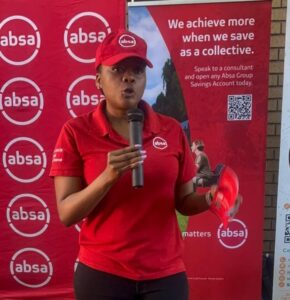It is October, and as thoughts turn to year-end holidays, we at SPAR consider that it is Transport Month and World Food Day, while many people are holiday-focused, we, in proud partnership with Stokvel Talk, are connecting with stokvel members and empowering them to make their savings work harder for their families.
Hosted at the Fleurhof Community Centre on Saturday 18 October, the Stokvel Talk event brought together community members, experts and SPAR representatives for an engaging, interactive session on smart saving, food security and community growth.
“Stokvels remain one of South Africa’s most trusted ways to save and invest,” says Mpudi Maubane, National PR, Communications and Sponsorships Manager at SPAR. “They show what’s possible when people come together with a shared goal, something that sits at the heart of every strong community.” Stokvels also reflect the same community values, such as cooperation, trust, and accountability, that keep South Africa’s local economies alive.
This October, as South Africa observes Transport Month and World Food Day, those values are being reflected not only in financial circles but across the country’s food and transport networks. According to Maubane, both stokvels and supply chains rely on connection and movement of money, goods, and opportunity. “Transport is the invisible thread that ties South Africa’s value chains together. It’s what allows small farmers, warehouse staff, and store owners to reach communities consistently, no matter how remote.”
SPAR’s own network provides an example of how that circular system works. Through the SPAR Rural, the retailer partners with small-scale farmers, many of them women, helping them transition from subsistence to commercial production. Their crops are collected, packed, and transported through regional hubs before appearing on urban shelves as part of the Freshline range.
“When families buy that produce, they’re indirectly supporting small growers across South Africa,” Maubane explains. “It’s a ripple effect where food security and income generation feed into each other.”
While stokvels focus on collective saving, programmes like SPAR Rewards and local bulk-buy options help households translate those savings into everyday value. SPAR continues to play a role in keeping food affordable for neighbourhood stokvels and families alike.
“The story here isn’t about one company or one community,” says Maubane. “It’s about South Africans finding practical ways to make limited resources work harder, whether that’s pooling money, sharing transport, or growing food locally. The power lies in the network.”
As economic pressure continues to affect households nationwide, stokvels, local producers, and community-based retailers are proving that cooperation still works.
“Every link in that chain matters,” Maubane adds. “When communities, farmers, and local businesses support one another, they build the kind of resilience that can’t be disrupted easily. That’s what keeps South Africa moving forward.”
 Plan now, save later: smart shopping ahead of the festive rush
Plan now, save later: smart shopping ahead of the festive rush

